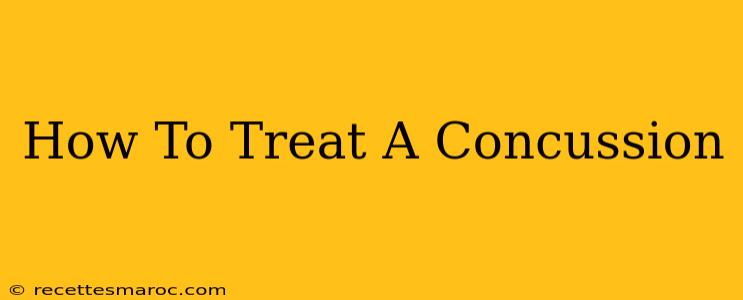A concussion, also known as a mild traumatic brain injury (mTBI), is a common injury resulting from a blow or jolt to the head or body that causes the brain to move rapidly back and forth inside the skull. This sudden movement can cause the brain to bounce against the skull or twist and stretch nerve fibers, resulting in temporary impairment of brain function. Knowing how to treat a concussion is crucial for recovery.
Understanding Concussion Symptoms
Recognizing the symptoms of a concussion is the first step in effective treatment. These symptoms can vary widely in severity and presentation, and may not always be immediately apparent. They can be broadly categorized as:
Physical Symptoms:
- Headache: Often the most common symptom, ranging from mild to severe.
- Dizziness: Feeling lightheaded or unsteady.
- Nausea and Vomiting: Can range from mild queasiness to severe vomiting.
- Balance Problems: Difficulty with coordination and stability.
- Sensitivity to Light and Noise: Photophobia and phonophobia are common.
- Fatigue: Feeling unusually tired and drained.
Cognitive Symptoms:
- Confusion: Difficulty concentrating or remembering things.
- Memory Problems: Trouble recalling recent events.
- Slowed Thinking: Difficulty processing information.
- Trouble Concentrating: Difficulty focusing on tasks.
Emotional Symptoms:
- Irritability: Feeling easily frustrated or angered.
- Anxiety: Feeling worried or uneasy.
- Sadness or Depression: Experiencing low mood or hopelessness.
- Changes in Sleep: Sleeping more or less than usual, or experiencing disrupted sleep.
Immediate Treatment After a Concussion
Immediate action is vital after a suspected concussion. The following steps should be taken:
-
Seek Medical Attention: It's crucial to consult a doctor or other qualified healthcare professional for proper diagnosis and treatment. Don't try to self-diagnose or treat a concussion.
-
Rest: Complete physical and cognitive rest is essential in the initial stages. This means avoiding strenuous activities, screens (phones, computers, TVs), reading, and demanding mental tasks.
-
Monitor for Worsening Symptoms: Closely observe the individual for any signs of worsening symptoms, such as increased headache, vomiting, seizures, or loss of consciousness. Seek immediate medical attention if any of these occur.
Long-Term Concussion Management
Recovery from a concussion can take time. The following strategies are important for long-term concussion management:
-
Gradual Return to Activities: A gradual return to physical activity and cognitive tasks is crucial to avoid setbacks. This process should be guided by a healthcare professional. The "step-wise" approach ensures the brain has time to recover without further injury.
-
Cognitive Rest: Avoid mentally taxing activities until symptoms improve. This may include limiting screen time, avoiding complex tasks, and breaking down tasks into smaller, more manageable parts.
-
Physical Therapy: Physical therapy can help improve balance, coordination, and overall physical function.
-
Medication: In some cases, medication may be necessary to manage symptoms such as headaches or nausea.
-
Therapy (Physical and Occupational): Depending on the severity and lasting effects, physical and occupational therapy may be beneficial in regaining lost function and improving quality of life.
When to Seek Immediate Medical Attention
Seek immediate medical care if you or someone you know experiences any of the following serious concussion symptoms:
- Loss of consciousness: Even brief periods of unconsciousness warrant immediate attention.
- Seizures: Any unusual or uncontrolled muscle movements.
- Worsening headache: A headache that intensifies significantly.
- Severe vomiting: Persistent vomiting that doesn't subside.
- Unequal pupil size: Noticeably different sizes of pupils.
- Weakness, numbness, or tingling: In any part of the body.
- Difficulty speaking or slurred speech: Any changes in speech patterns.
Preventing Concussions
Prevention is key. Here are some ways to reduce your risk of concussion:
- Wear Protective Gear: Always wear appropriate protective gear when participating in sports or activities that carry a risk of head injury (e.g., helmets for cycling, football, etc.).
- Follow Safety Guidelines: Adhere to safety guidelines and rules in any activity that could cause head trauma.
- Drive Safely: Avoid distracted driving and always wear a seatbelt.
This information is for general knowledge and does not constitute medical advice. Always consult a healthcare professional for diagnosis and treatment of a concussion. Early intervention and proper management are key to a full recovery.

